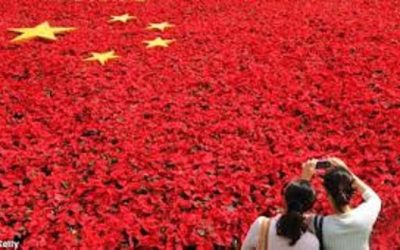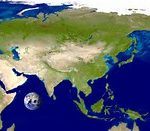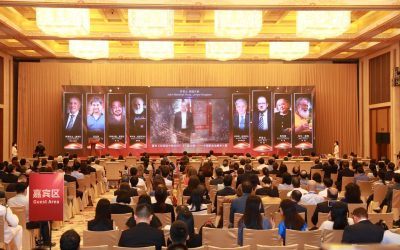In his speech on Asia’s “Community of Common Destiny” at 2015’a Boao Forum, Chinese President Xi Jinping spelled out China’s conception of “win-win” relations in Asia and the world. This therefore provides a good opportunity to examine the fundamental bases of China’s foreign policy. It also highlights the reason for the recent failure of the United States to persuade several countries not to join the Asian Infrastructure Investment Bank (AIIB).
Such analysis also immediately clarifies why the idea of “win-win,” the core of China’s foreign policy approach, is not just a clever piece of PR but has a clear economic basis which underpins its other dimensions. It also illustrates why immediate economic questions in Xi Jinping’s speech – the AIIB, the “New Silk Road,” China’s “Belt and Road” initiatives for infrastructure links in Asia – were connected to wider observations on cultural and “civilizational” relations between countries.
To address first the economic core issue, Adam Smith, the founder of modern economics, noted in the first sentence of “The Wealth of Nations” that the most powerful force in economic development was division of labor, including international division of labor: “The greatest improvement in the productive powers of labor, and the greater part of the skill, dexterity, and judgment with which it is directed, or applied, seem to have been the effect of the division of labor.” The rest of Smith’s analysis unfolds from this starting point.
Others had previously described division of labor, but Smith’s genius was to understand its implications – not only for international trade, which he famously advocated, but also for domestic development. However, such increasing division of labor has the immediate consequence of making one producer increasingly dependent on inputs from others. Put in technical economic terms, indirect inputs into production, that is products created by others, rise relative to direct ones.
In the most modern form of this process, contemporary globalization, such as networks of interconnected production, span the globe. For example, the WTO found that only 37 percent of the value in a typical “U.S. car” was actually added in the U.S. Because of the use of numerous components – batteries, wheels, seats etc. – 30 percent of the value in the car was from South Korea, 18 percent from Japan, 8 percent from Germany and 4 percent from Singapore and Taiwan. Only such a vast interconnected web of production makes modern efficiency – and therefore contemporary high living standards – possible.
Indirect inputs are not limited to components, as with the parts of a car, but involve numerous other aspects of production. Investment goods, the machine tools and the machinery used in production are also indirect inputs. Rises in such indirect inputs historically have increased the proportion of the economy devoted to investment. Specialized scientific research centers, a highly advanced form of division of labor, are created, increasing the percentage of research and development in the economy. Higher-level skills needed to carry out sophisticated production require longer periods of education, so teaching in schools and universities therefore constitutes an indirect input into production.
Globalization, the basis for advanced production, consequently increases not only the volume of components, trade or raw materials but also the level of investment, scientific research, education, culture and innumerable other features of human civilization.
China, a socialist country, has been more directly influenced by Karl Marx than by Adam Smith in forming its analysis of this development, but on this issue there was no difference between the two – Marx criticized national protectionist policies from their earliest modern appearance.
Such international production forms the firm economic basis for “win-win” relations between countries. Each country can achieve greater economic efficiency by specializing within global division of labor than if it attempted to be self-sufficient. This is why factual economic research clearly demonstrates that internationally “open” economies greatly outperform “closed” ones, China’s “Opening Up” policy being one of the world’s biggest examples.
This international “opening” of the economy in all countries in turn necessarily means that states become more interrelated with each other, creating – as in the central concept of the Boao Forum – a “Community of Common Destiny.” Increasing mutual trade and investment requires not only reductions of tariffs and the creation of free trade zones but also the physical means to permit such interaction to take place – ports, railways, highways, airports and telecommunications links. This is the reason for the importance of the AIIB and similar infrastructure initiatives.
The advantage of international division of labor means, as Xi Jinping stated in a slightly different context, that one plus one can be greater than two. In economic analysis based on both Smith and Marx, mutual benefit results from this process. China’s emphasis on “win-win” is therefore not simply rhetoric but is practically grounded in fundamental economic analysis. Furthermore, independently of whether other countries are or are not interested in the Smithean and Marxist basis of China’s foreign policy, they are certainly interested in its practical proposals.
To illustrate this, take the AIIB. The United Kingdom decided to join the bank, breaking ranks with U.S. attempts to persuade other countries not to participate, because it saw a “win-win.” China certainly benefits from the AIIB, as the bank will finance infrastructure in Asia, thereby increasing China’s trade. But the U.K. will also “win,” as London has great expertise in financial services, enabling the U.K. to provide inputs and derive benefits greater even than its allocation of capital to the AIIB.
The U.S. in contrast proposed a “win-lose” to the U.K. and other countries in urging them not to participate in the AIIB. China would win as it has the finances to proceed with the AIIB, but Britain would lose as it would not gain the benefits of participation. The U.K. logically preferred the solution in which China wins and the U.K. wins to the U.S. proposal in which China wins and the U.K. loses.
But in addition to narrowly defined economic issues, the increasing productivity created by expanding division of labor has underpinned the fundamental historical development of human civilizations and their interactions, creating the wider themes addressed in Xi Jinping’s speech.
Humanity originated in small, primarily self-sufficient communities. Around 5,000 years ago, these developed into larger city-ruled territorial units, creating civilizations in the Tigris and Euphrates, in Egypt, in the Indus valley and in parts of China. Within Asia, as Xi Jinping put it in his Boao speech, “History, over the past millennia, has witnessed ancient civilizations appear and thrive along the Yellow and Yangtze Rivers, the Indus, the Ganges, the Euphrates, and the Tigris River as well as in Southeast Asia.”
In the 2nd and 3rd centuries B.C., still larger territorial units coalesced, forming the recognizable core of modern cultures and states – the Qin and Han dynasties unified China, the Roman Empire united Europe and the Mauryan Empire ruled much of India. Then from the 7th century A.D. these three centers became even more strongly economically linked by the rise of Islamic empires in the Middle East and Central Asia. In 1492, Columbus created permanent economic ties across the Atlantic, integrating all the largest continents and thereby establishing for the first time a truly global system.
Modern globalization is the progressive deepening of this process, with constantly increasing proportions of the economy devoted to foreign trade and foreign investment.
Nevertheless, to turn to wider issues, global economic integration proceeded far more rapidly than integration of cultures an
d civilizations. Certainly in the modern world many features of life in Beijing, New York, Paris, London, Delhi and the like are similar. People drive cars, use subway systems, live in apartments, use smartphones and interact on social media. Even common short term worldwide cultural crazes develop now, South Korea’s rise being reflected not only in the popularity of Samsung phones but in the more than two billion worldwide viewings of the video sensation, “Gangnam Style.”
But when we reflect on the historically extremely differentiated origins of humanity, major differences between cultures and civilizations remain. In real life, human beings cannot be split into strictly economic and strictly civilizational parts – real humans possess both aspects. How, therefore, can not only economies but civilizations and cultures relate for mutual benefit?
This is an issue Xi Jinping has addressed on several occasions. In his speech at the Boao Forum, he dealt with the political aspect: “Countries may differ in size, strength or level of development, but they are all equal members of the international community with equal rights to participate in regional and international affairs.”
But he also outlined a cultural aspect: “Mencius, the great ancient Chinese philosopher, said, ‘Things are born to be different.’ Civilizations are only unique, and no one is superior to the other. There needs to be more exchange and dialogue among civilizations and development models, so that each can draw on the strength of the other and all can thrive and prosper through mutual learning and common development. Let us promote inter-civilization exchanges to build bridges of friendship for our people, drive human development and safeguard peace in the world.”
Earlier, in a speech to UNESCO, Xi Jinping dealt still more widely with China’s analysis of this cultural aspect, analyzing the way civilizations and cultures originated as crystallizations of particular human experiences:
“Civilizations are equal, and such equality has made exchanges and mutual learning among civilizations possible. All human civilizations… have their respective strengths and weaknesses. No civilization is perfect on the planet, nor is it devoid of merit. No single civilization can be judged superior to another…
“I have visited many places in the world. What interested me most… was to learn about differing civilizations across the five continents, what makes them different and unique, how their people think about the world and life and what they hold dear… An attitude of equality and modesty is required if one wants to truly understand various civilizations… Both history and reality show that pride and prejudice are the biggest obstacles to exchanges and mutual learning among civilizations…
“Civilizations are inclusive, and such inclusiveness has given exchanges and mutual learning among civilizations the impetus to move forward. The ocean is vast because it refuses no rivers. All civilizations are crystallizations of mankind’s diligence and wisdom. Every civilization is unique. Copying other civilizations blindly or mechanically is like cutting one’s toes to fit one’s shoes – impossible and highly detrimental. All achievements of civilizations deserve our respect and must be cherished.
“History proves that only by interacting with and learning from others can a civilization enjoy full vitality. If all civilizations are inclusive, the so-called ‘clash of civilizations’ can be avoided and harmony among civilizations will become a reality.”
Therefore, in China’s conception, economic and cultural interactions are entirely integrated and flow from a common basis. The economic “win-win” flows from benefits derived from the global division of labor. The “win-win” benefits in culture and civilization result from the interaction of different experiences reflected in different cultures, which in turn reflect the differentiated aspects of humanity’s development. Therefore the outcome – both in the realm of economics and culture/civilization – is win-win.
It is striking to contrast China’s view with the entirely different U.S. concept. The latter is sometimes referred to as “American exceptionalism,” but that is actually an attempt to soften it. The accurate term is “U.S. supremacism” – the U.S. leads, others follow, and the U.S. sees itself as superior to other countries. As Michael Mandelbaum, a key U.S. foreign policy expert, noted regarding the narrow issue of U.S. foreign policy, “For the [U.S.] foreign policy elite, the need for American leadership in the world is a matter of settled conviction.”
More widely, Condoleezza Rice, former U.S. Secretary of State, sought to justify this concept by claiming that “American pre-eminence safeguards rather than impedes global progress.”
From a more popular perspective, the logic behind frequent U.S. statements implying that the U.S. is the greatest country in the world, and even that the U.S. is the greatest country that has ever existed in history, essentially states that other countries, including China, are inferior. If the U.S. is the “greatest” country, others are by definition less good. In such a framework, the situation is not one of equality and mutual benefit but is seen by the U.S. as a zero-sum game, wherein any establishment of equality with the U.S. means the United States has necessarily lost its position as the leader that others are destined to merely follow.
Not accidentally, such concepts are linked to a different U.S. economic analysis. Despite occasionally rhetorically invoking Adam Smith’s name, the U.S. long ago abandoned his economic views on mutually beneficial division of labor (the U.S., of course, never claimed to adhere to Marx, who had the same ideas). Instead, in the “neo-liberal/neo classical” economic analysis which in the U.S. long ago replaced the “classical” economics of Smith and those who followed him, the economy is supposed to consist of isolated competing units.
Smith’s great economic insight provided the basis for understanding why the development of the individual and the development of humanity were not antagonistic but complimentary, because only via collaboration in division of labor could a high standard of living and the adequately fulfilment of individual needs be achieved. U.S. neo-liberalism replaced this with the empty and false concept of a competitive war of “all against all.”
China’s concept is mutual benefit, of “win-win” in economics, culture and civilization. The U.S. concept is competition, zero sum games, and United States supremacy.
Not only is China’s concept more correct from a fundamental theoretical point of view, but as the AIIB shows, it is increasingly more effective. Other countries don’t want to be followers of “U.S. leadership,” creating win-lose outcomes for themselves in order to meet U.S. interests. Neither do they consider themselves inferior to the U.S. They want the win-win outcomes proposed by China, and the mutual respect which its foreign policy concepts involve.
Not only were China’s concepts expressed in Xi Jinping’s speech to the Boao Forum but they were also the reason why, more immediately, the U.S. suffered what the The Economist magazine has rightly termed the “fiasco” over the issue of the AIIB.
Such analysis also immediately clarifies why the idea of “win-win,” the core of China’s foreign policy approach, is not just a clever piece of PR but has a clear economic basis which underpins its other dimensions. It also illustrates why immediate economic questions in Xi Jinping’s speech – the AIIB, the “New Silk Road,” China’s “Belt and Road” initiatives for infrastructure links in Asia – were connected to wider observations on cultural and “civilizational” relations between countries.
To address first the economic core issue, Adam Smith, the founder of modern economics, noted in the first sentence of “The Wealth of Nations” that the most powerful force in economic development was division of labor, including international division of labor: “The greatest improvement in the productive powers of labor, and the greater part of the skill, dexterity, and judgment with which it is directed, or applied, seem to have been the effect of the division of labor.” The rest of Smith’s analysis unfolds from this starting point.
Others had previously described division of labor, but Smith’s genius was to understand its implications – not only for international trade, which he famously advocated, but also for domestic development. However, such increasing division of labor has the immediate consequence of making one producer increasingly dependent on inputs from others. Put in technical economic terms, indirect inputs into production, that is products created by others, rise relative to direct ones.
In the most modern form of this process, contemporary globalization, such as networks of interconnected production, span the globe. For example, the WTO found that only 37 percent of the value in a typical “U.S. car” was actually added in the U.S. Because of the use of numerous components – batteries, wheels, seats etc. – 30 percent of the value in the car was from South Korea, 18 percent from Japan, 8 percent from Germany and 4 percent from Singapore and Taiwan. Only such a vast interconnected web of production makes modern efficiency – and therefore contemporary high living standards – possible.
Indirect inputs are not limited to components, as with the parts of a car, but involve numerous other aspects of production. Investment goods, the machine tools and the machinery used in production are also indirect inputs. Rises in such indirect inputs historically have increased the proportion of the economy devoted to investment. Specialized scientific research centers, a highly advanced form of division of labor, are created, increasing the percentage of research and development in the economy. Higher-level skills needed to carry out sophisticated production require longer periods of education, so teaching in schools and universities therefore constitutes an indirect input into production.
Globalization, the basis for advanced production, consequently increases not only the volume of components, trade or raw materials but also the level of investment, scientific research, education, culture and innumerable other features of human civilization.
China, a socialist country, has been more directly influenced by Karl Marx than by Adam Smith in forming its analysis of this development, but on this issue there was no difference between the two – Marx criticized national protectionist policies from their earliest modern appearance.
Such international production forms the firm economic basis for “win-win” relations between countries. Each country can achieve greater economic efficiency by specializing within global division of labor than if it attempted to be self-sufficient. This is why factual economic research clearly demonstrates that internationally “open” economies greatly outperform “closed” ones, China’s “Opening Up” policy being one of the world’s biggest examples.
This international “opening” of the economy in all countries in turn necessarily means that states become more interrelated with each other, creating – as in the central concept of the Boao Forum – a “Community of Common Destiny.” Increasing mutual trade and investment requires not only reductions of tariffs and the creation of free trade zones but also the physical means to permit such interaction to take place – ports, railways, highways, airports and telecommunications links. This is the reason for the importance of the AIIB and similar infrastructure initiatives.
The advantage of international division of labor means, as Xi Jinping stated in a slightly different context, that one plus one can be greater than two. In economic analysis based on both Smith and Marx, mutual benefit results from this process. China’s emphasis on “win-win” is therefore not simply rhetoric but is practically grounded in fundamental economic analysis. Furthermore, independently of whether other countries are or are not interested in the Smithean and Marxist basis of China’s foreign policy, they are certainly interested in its practical proposals.
To illustrate this, take the AIIB. The United Kingdom decided to join the bank, breaking ranks with U.S. attempts to persuade other countries not to participate, because it saw a “win-win.” China certainly benefits from the AIIB, as the bank will finance infrastructure in Asia, thereby increasing China’s trade. But the U.K. will also “win,” as London has great expertise in financial services, enabling the U.K. to provide inputs and derive benefits greater even than its allocation of capital to the AIIB.
The U.S. in contrast proposed a “win-lose” to the U.K. and other countries in urging them not to participate in the AIIB. China would win as it has the finances to proceed with the AIIB, but Britain would lose as it would not gain the benefits of participation. The U.K. logically preferred the solution in which China wins and the U.K. wins to the U.S. proposal in which China wins and the U.K. loses.
But in addition to narrowly defined economic issues, the increasing productivity created by expanding division of labor has underpinned the fundamental historical development of human civilizations and their interactions, creating the wider themes addressed in Xi Jinping’s speech.
Humanity originated in small, primarily self-sufficient communities. Around 5,000 years ago, these developed into larger city-ruled territorial units, creating civilizations in the Tigris and Euphrates, in Egypt, in the Indus valley and in parts of China. Within Asia, as Xi Jinping put it in his Boao speech, “History, over the past millennia, has witnessed ancient civilizations appear and thrive along the Yellow and Yangtze Rivers, the Indus, the Ganges, the Euphrates, and the Tigris River as well as in Southeast Asia.”
In the 2nd and 3rd centuries B.C., still larger territorial units coalesced, forming the recognizable core of modern cultures and states – the Qin and Han dynasties unified China, the Roman Empire united Europe and the Mauryan Empire ruled much of India. Then from the 7th century A.D. these three centers became even more strongly economically linked by the rise of Islamic empires in the Middle East and Central Asia. In 1492, Columbus created permanent economic ties across the Atlantic, integrating all the largest continents and thereby establishing for the first time a truly global system.
Modern globalization is the progressive deepening of this process, with constantly increasing proportions of the economy devoted to foreign trade and foreign investment.
Nevertheless, to turn to wider issues, global economic integration proceeded far more rapidly than integration of cultures an
d civilizations. Certainly in the modern world many features of life in Beijing, New York, Paris, London, Delhi and the like are similar. People drive cars, use subway systems, live in apartments, use smartphones and interact on social media. Even common short term worldwide cultural crazes develop now, South Korea’s rise being reflected not only in the popularity of Samsung phones but in the more than two billion worldwide viewings of the video sensation, “Gangnam Style.”
But when we reflect on the historically extremely differentiated origins of humanity, major differences between cultures and civilizations remain. In real life, human beings cannot be split into strictly economic and strictly civilizational parts – real humans possess both aspects. How, therefore, can not only economies but civilizations and cultures relate for mutual benefit?
This is an issue Xi Jinping has addressed on several occasions. In his speech at the Boao Forum, he dealt with the political aspect: “Countries may differ in size, strength or level of development, but they are all equal members of the international community with equal rights to participate in regional and international affairs.”
But he also outlined a cultural aspect: “Mencius, the great ancient Chinese philosopher, said, ‘Things are born to be different.’ Civilizations are only unique, and no one is superior to the other. There needs to be more exchange and dialogue among civilizations and development models, so that each can draw on the strength of the other and all can thrive and prosper through mutual learning and common development. Let us promote inter-civilization exchanges to build bridges of friendship for our people, drive human development and safeguard peace in the world.”
Earlier, in a speech to UNESCO, Xi Jinping dealt still more widely with China’s analysis of this cultural aspect, analyzing the way civilizations and cultures originated as crystallizations of particular human experiences:
“Civilizations are equal, and such equality has made exchanges and mutual learning among civilizations possible. All human civilizations… have their respective strengths and weaknesses. No civilization is perfect on the planet, nor is it devoid of merit. No single civilization can be judged superior to another…
“I have visited many places in the world. What interested me most… was to learn about differing civilizations across the five continents, what makes them different and unique, how their people think about the world and life and what they hold dear… An attitude of equality and modesty is required if one wants to truly understand various civilizations… Both history and reality show that pride and prejudice are the biggest obstacles to exchanges and mutual learning among civilizations…
“Civilizations are inclusive, and such inclusiveness has given exchanges and mutual learning among civilizations the impetus to move forward. The ocean is vast because it refuses no rivers. All civilizations are crystallizations of mankind’s diligence and wisdom. Every civilization is unique. Copying other civilizations blindly or mechanically is like cutting one’s toes to fit one’s shoes – impossible and highly detrimental. All achievements of civilizations deserve our respect and must be cherished.
“History proves that only by interacting with and learning from others can a civilization enjoy full vitality. If all civilizations are inclusive, the so-called ‘clash of civilizations’ can be avoided and harmony among civilizations will become a reality.”
Therefore, in China’s conception, economic and cultural interactions are entirely integrated and flow from a common basis. The economic “win-win” flows from benefits derived from the global division of labor. The “win-win” benefits in culture and civilization result from the interaction of different experiences reflected in different cultures, which in turn reflect the differentiated aspects of humanity’s development. Therefore the outcome – both in the realm of economics and culture/civilization – is win-win.
It is striking to contrast China’s view with the entirely different U.S. concept. The latter is sometimes referred to as “American exceptionalism,” but that is actually an attempt to soften it. The accurate term is “U.S. supremacism” – the U.S. leads, others follow, and the U.S. sees itself as superior to other countries. As Michael Mandelbaum, a key U.S. foreign policy expert, noted regarding the narrow issue of U.S. foreign policy, “For the [U.S.] foreign policy elite, the need for American leadership in the world is a matter of settled conviction.”
More widely, Condoleezza Rice, former U.S. Secretary of State, sought to justify this concept by claiming that “American pre-eminence safeguards rather than impedes global progress.”
From a more popular perspective, the logic behind frequent U.S. statements implying that the U.S. is the greatest country in the world, and even that the U.S. is the greatest country that has ever existed in history, essentially states that other countries, including China, are inferior. If the U.S. is the “greatest” country, others are by definition less good. In such a framework, the situation is not one of equality and mutual benefit but is seen by the U.S. as a zero-sum game, wherein any establishment of equality with the U.S. means the United States has necessarily lost its position as the leader that others are destined to merely follow.
Not accidentally, such concepts are linked to a different U.S. economic analysis. Despite occasionally rhetorically invoking Adam Smith’s name, the U.S. long ago abandoned his economic views on mutually beneficial division of labor (the U.S., of course, never claimed to adhere to Marx, who had the same ideas). Instead, in the “neo-liberal/neo classical” economic analysis which in the U.S. long ago replaced the “classical” economics of Smith and those who followed him, the economy is supposed to consist of isolated competing units.
Smith’s great economic insight provided the basis for understanding why the development of the individual and the development of humanity were not antagonistic but complimentary, because only via collaboration in division of labor could a high standard of living and the adequately fulfilment of individual needs be achieved. U.S. neo-liberalism replaced this with the empty and false concept of a competitive war of “all against all.”
China’s concept is mutual benefit, of “win-win” in economics, culture and civilization. The U.S. concept is competition, zero sum games, and United States supremacy.
Not only is China’s concept more correct from a fundamental theoretical point of view, but as the AIIB shows, it is increasingly more effective. Other countries don’t want to be followers of “U.S. leadership,” creating win-lose outcomes for themselves in order to meet U.S. interests. Neither do they consider themselves inferior to the U.S. They want the win-win outcomes proposed by China, and the mutual respect which its foreign policy concepts involve.
Not only were China’s concepts expressed in Xi Jinping’s speech to the Boao Forum but they were also the reason why, more immediately, the U.S. suffered what the The Economist magazine has rightly termed the “fiasco” over the issue of the AIIB.
* * *
This article originally appeared at China.org.cn on 30 March 2015
Related articles
China’s socialist economy will deal with the global inflationary wave launched by US economic policy
China’s 8.1% GDP increase in 2021, following on from 2.2% in 2020, will exceed that of any other ...
Read More Why China has made the world’s greatest contribution to increasing human rights
The U.S. Congress has debated expressing its concern over the issue of ‘human rights’ in China - an example ...
Read More How IMF policies helped oligarchs loot Russia – lessons for China and other countries
In 1992-98 the greatest peacetime economic collapse in a major country since at least the Industrial Revolution ...
Read More The most important book on economic growth to have appeared for many years
Vu Minh Khuong's The Dynamics of Economic Growth is the most important book on world economic growth to have appeared for many ...
Read More My Thoughts on Receiving China’s Top Book Award for Foreign Writers on China
In June I was one of the recipients of the Special Book Award of China. The official description ...
Read More 





